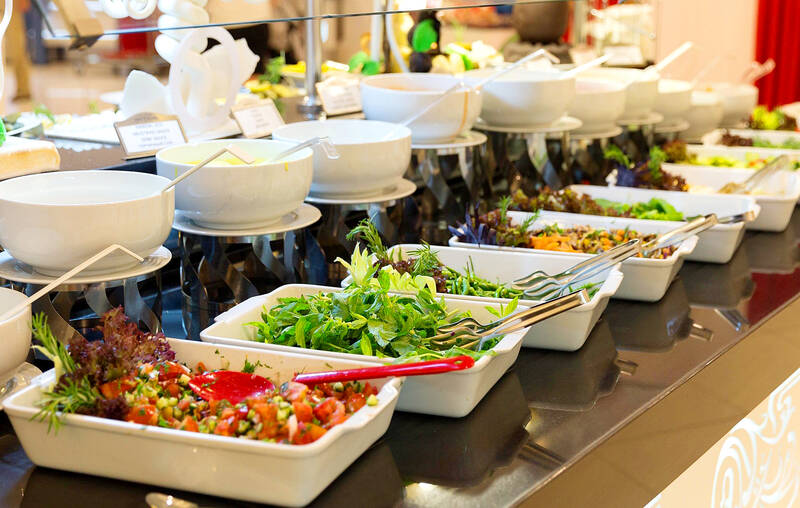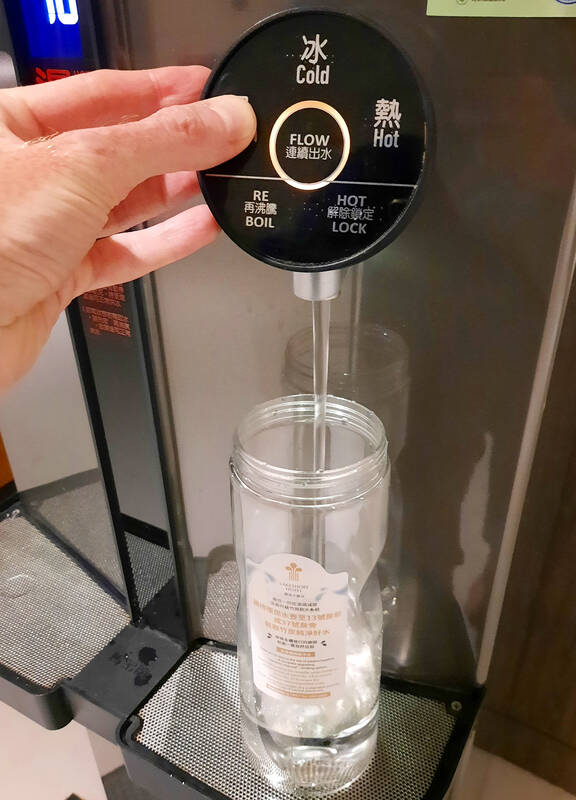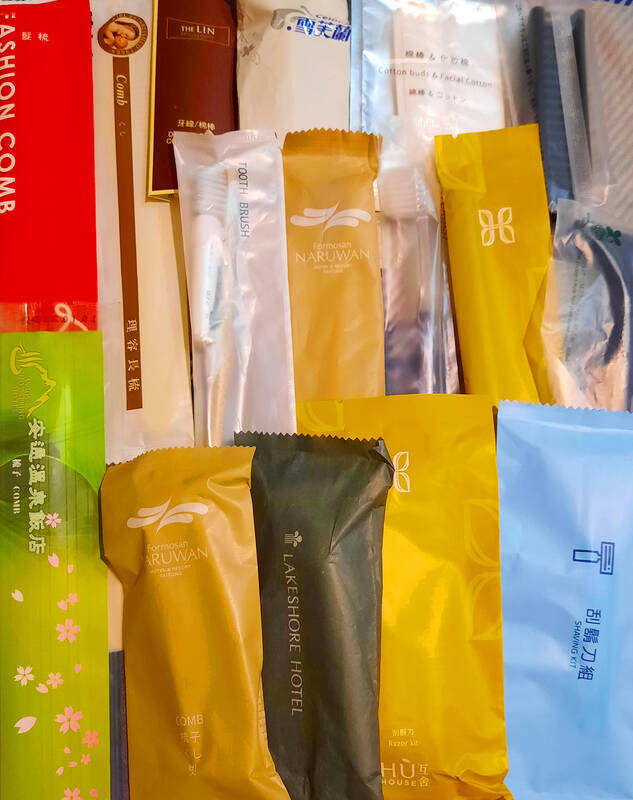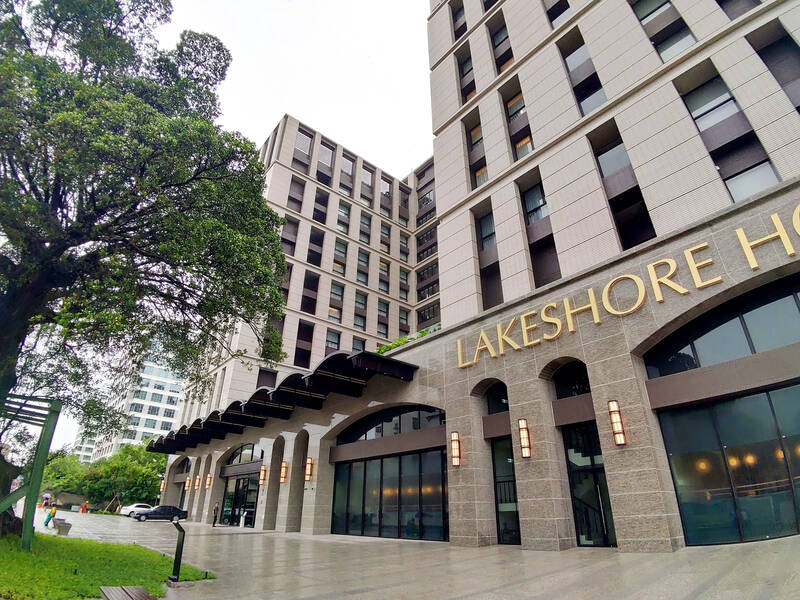More so than most businesses, hotels face a difficult balancing act as they try to operate sustainably.
When people check into a hotel — especially a luxury property — they expect to enjoy a certain amount of pampering. For many, staying in an upmarket hotel is a respite from budget-conscious reality. As Shaun Bettinson, solutions director at Taichung-based RCI Sustainability Group, puts it: “They don’t want to have to use the same towel two days’ running.”
A typical hotel is a resource-intensive structure, whether people are staying in it or not, he says. And because they prosper or perish by their ability to provide comfort, some accommodation providers “are “scared by the word ‘sustainability,’” he says.

Photo: Steven Crook
It’s no secret that, compared to ordinary households, hotels are profligate consumers of electricity and water. One reason, Bettinson says, is that major hotels are 24-hour operations, so various amenities and capacities are on standby around the clock. Another is that hotel occupancy rates are constantly changing, whereas the number of people using an office building — and the times at which they arrive and depart — is far more stable and predictable.
Since 2023, Bettinson has been working with the 538-room Regent Taipei, the first Taiwan hotel to join the international EarthCheck certification process for tourism businesses and destinations.
RATING SYSTEM

Photo: Steven Crook
Brisbane, Australia-based EarthCheck “offers a benchmarking system, so hotels can see how they’re doing compared to their peers, and how they can reduce their environmental impact,” the Englishman says.
Because government subsidies are available, and the upfront cost is low, the program is “a practical step for hotels looking to take meaningful sustainability action without incurring a major financial burden,” Bettinson says.
He adds that, when trying to persuade executives to sign up to Earthcheck, he stresses that the process overlaps by as much as 70 percent with work they’d need to do anyway if the business is required to publish an annual Environmental Social and Governance (ESG) report.

Photo: Steven Crook
Like green-building certification systems such as LEED in the US and Taiwan’s EEWH, energy saving is a key element of the EarthCheck process. Because it’s tailored to the tourism industry, however, EarthCheck focuses on “guest nights” rather than floor area. (One room occupied overnight by two people counts as two guest nights.) But for hotels that host events open to outsiders and operate restaurants that attract large numbers of non-guests, calculating carbon footprint and energy efficiency can be very complicated.
Unlike LEED or EEWH, EarthCheck is an annual program. Participating businesses pay an annual fee, but reduced operating costs once inefficiencies are identified and addressed may offset part of this expense.
In Taiwan, Bettinson says, the biggest challenge that faces hotels hoping to obtain EarthCheck certification is finding the time to locate and input accurate data.

Photo: TT file photo
“They have all of it. They just need to collect it and put it into the system,” he says, while acknowledging that the local hospitality industry suffers from a significant labor shortage.
Once the process is underway, it’s important that the property’s sustainability goals, and the methods being used to attain them, “are communicated and implemented right down to the person changing the sheets. [This effort] can’t exist just at the top level among directors,” Bettinson says.
THE WAR AGAINST PLASTIC
According to one estimate, Taiwan’s 14,000 hotels, motels and B&Bs were until very recently responsible for 460 million pieces of single-use plastic entering the wastestream each year.
Local efforts to make the hotel industry a bit greener began almost two decades ago with the Environmental Protection Administration’s (now the Ministry of the Environment) National Eco-friendly Hotel and Business Group Competition. It wasn’t until Jan. 1 this year, however, that it became illegal for accommodation providers to provide for free such items as combs, toothbrushes or toothpaste, or liquid toiletries in single-use containers smaller than 180ml. Guests who require such products now have to pay for them.
A similar law took effect in South Korea in March last year, but it applies only to lodging establishments with 50 or more rooms.
In 2023, California banned the provision of small plastic bottles of personal care products in hotels and vacation rentals. Similar rules will kick in this year in New York and Illinois. In Washington state, the ban is due to go into effect in 2027.
Taiwan’s single-use toiletries policy is one of the more advanced in Asia, says Monique Chen (陳盈潔), co-founder and chairwoman of Sustainable Travel Taiwan (STT, 台灣永續旅行協會), an NGO established in 2011. As recently as three years ago, she says, local hotels were arguing that it’d be impossible for them to reduce their use of single-use toiletries and plastic drinking-water bottles.
Saying that she doesn’t know enough about EarthCheck to judge whether it’s a useful tool or could be misused by businesses trying to greenwash their operations, Chen says that sustainability labels should cover four “pillars”: environment and climate; community and labor rights; culture; and management.
Because STT’s goal is to help businesses achieve true sustainability, “we adopt the tools or certification systems that work well and can really make a change,” says Chen, who was the first person in Taiwan to qualify as a trainer with the Global Sustainable Tourism Council (GSTC).
In cases where the hotel’s management is limited in what it can do, because the building itself is owned by another entity, brainstorming and creativity can go a long way.
Menu design can help reduce hotels’ food-related carbon emissions. By keeping beef and farmed shrimp off the main page, and highlighting vegan options, guests can be nudged toward eco-friendly dining decisions.
GREEN CERTIFICATION
Chen gives another example. At one award-winning hotel she visited, the slogan “1+1<2” is prominent in each bathroom, reminding guests that when two people shower together, they use less water.
STT’s Web site (sustainabletravel.org.tw) includes a map of businesses and destinations that have obtained green certifications.
Among them are high-end hotels like Mandarin Oriental, Taipei and small properties such as The Easy Space, a 5-room homestay in New Taipei’s Gongliao District (貢寮). Also listed is Footprint Inn in Nantou County’s Jiji Township (集集), which says on its Web site to have been the first hotel in Taiwan to receive the Control Union/GSTC International Sustainable Hotel Certification, as well as the first in the country to attain the highest possible level-three rating under the Good Travel Seal (GTS) sustainability assessment.
Certain establishments have made significant advances, yet some tourism specialists perceive a widespread and worrying lack of urgency among local hoteliers. Of the country’s thousands of hotels and homestays, just 154 hold environmental certifications, the Liberty Times (the Chinese-language sister newspaper of the Taipei Times) reported on March 1 this year.
The newspaper quoted a local scholar as warning that a lack of certified green hotels, especially in Taipei, could hold back the MICE (meetings, incentive travel, conferences and exhibitions) sector. If the country is to attract international conferences and events, it cannot ignore the ESG trend, he said.
Just as major brands must now ensure their supply chain is unsullied by environmental or human-rights abuses, event organizers are beginning to insist that everything from the conference venue to the hotel in which attendees will stay meets sustainability standards. For lodging businesses that have yet to prioritize sustainability, the near-term threat of lost bookings may galvanize them more effectively than more distant environmental concerns.
Steven Crook, the author or co-author of four books about Taiwan, has been following environmental issues since he arrived in the country in 1991. He drives a hybrid and carries his own chopsticks. The views expressed here are his own.

Growing up in a rural, religious community in western Canada, Kyle McCarthy loved hockey, but once he came out at 19, he quit, convinced being openly gay and an active player was untenable. So the 32-year-old says he is “very surprised” by the runaway success of Heated Rivalry, a Canadian-made series about the romance between two closeted gay players in a sport that has historically made gay men feel unwelcome. Ben Baby, the 43-year-old commissioner of the Toronto Gay Hockey Association (TGHA), calls the success of the show — which has catapulted its young lead actors to stardom -- “shocking,” and says

The 2018 nine-in-one local elections were a wild ride that no one saw coming. Entering that year, the Chinese Nationalist Party (KMT) was demoralized and in disarray — and fearing an existential crisis. By the end of the year, the party was riding high and swept most of the country in a landslide, including toppling the Democratic Progressive Party (DPP) in their Kaohsiung stronghold. Could something like that happen again on the DPP side in this year’s nine-in-one elections? The short answer is not exactly; the conditions were very specific. However, it does illustrate how swiftly every assumption early in an

Inside an ordinary-looking townhouse on a narrow road in central Kaohsiung, Tsai A-li (蔡阿李) raised her three children alone for 15 years. As far as the children knew, their father was away working in the US. They were kept in the dark for as long as possible by their mother, for the truth was perhaps too sad and unjust for their young minds to bear. The family home of White Terror victim Ko Chi-hua (柯旗化) is now open to the public. Admission is free and it is just a short walk from the Kaohsiung train station. Walk two blocks south along Jhongshan

Francis William White, an Englishman who late in the 1860s served as Commissioner of the Imperial Customs Service in Tainan, published the tale of a jaunt he took one winter in 1868: A visit to the interior of south Formosa (1870). White’s journey took him into the mountains, where he mused on the difficult terrain and the ease with which his little group could be ambushed in the crags and dense vegetation. At one point he stays at the house of a local near a stream on the border of indigenous territory: “Their matchlocks, which were kept in excellent order,